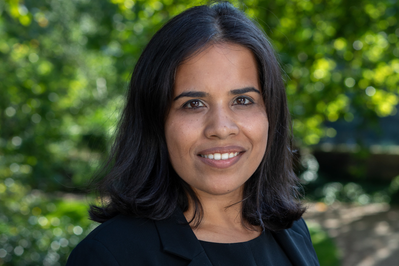Tahina Akther

Tell us about your background and why you decided to become a barrister.
I am the daughter of Bangladeshi immigrants, growing up with English very much a second language at home and amongst my local community. My father was a steelworker in a Northern industrial town, whilst my mother was, very traditionally, a home maker. I attended local state schools which had a high percentage of migrant children, and most of my peers left school to take up work in the steelworks or other traditional industries.
Did you face any obstacles along your journey to becoming a barrister and how did you overcome them? Have any of them persisted since becoming a barrister?
When I expressed my desire to go to university, some of the local community were very vocal in expressing the view that girls from my background had no place at university, let alone in gaining a career. They believed that education for girls was only useful in so far as it enabled you to secure a better husband, and too much education would be detrimental to this.
I decided to pursue a career at the Bar because fortunately my parents believed in education and wanted more for me. However, I was told that if I was to go to university it would have to be medicine or law – they didn’t know of other subjects. I picked law – I had about heard how few people made it to practising at the Bar, and this appealed to the stubborn side of me.
What opportunities, support and encouragement did you receive along your journey to becoming a barrister?
I was fortunate enough to meet a barrister whilst doing work experience in a solicitor’s firm in my hometown. That was the first time I had ever met one. I was at university at the time and was inspired. Subsequently, I met another barrister whilst at Bar school – the first barrister I’d met who looked like me. She became a very valued source of advice and guidance in my early days of my career.
What is the most rewarding thing about being a barrister; has life at the Bar met your expectations?
I have found the variety of work and the ability to have a successful practice and enjoy plentiful time with my family to be the most rewarding aspects of the job. Although it was tough in the early years because I felt like an imposter from my background, life at the Bar has far exceeded my expectations as time has progressed. I genuinely love it.
How do you use your experience of coming to the Bar from an under-represented background to support those seeking to do the same, and/or why is it important for barristers to contribute in this way?
I am an active member of Bar None (Western Circuit) whose aim is to encourage diversity at the Bar. I regularly take part in webinars, panels and deliver presentations to schools and aspiring barristers. Over the years I have been proud to support several mentees. I am also my Chamber’s Equality, Diversity and Inclusion Officer and I have set a programme of events this year to enable aspiring barristers from under-represented backgrounds to get an insight into the Bar.
How do you think the challenges around social mobility at the Bar which face aspiring barristers today could be addressed?
I strongly believe in the elevator principle and the responsibility on barristers like myself to enable others from non-traditional and underrepresented backgrounds to enter the Bar.
I believe better and earlier information about careers in law should be provided to children in state schools. There needs to be a review into how we provide financial support to ensure that finances are not a barrier to entry.
What advice would you give to someone from an under-represented background, seeking to succeed at the Bar?
I often provide advice to those looking at pursuing a career at the Bar, the main points being:
- Do your research
- Find a mentor
- Don’t be put off by the need to accrue debt
- Be stubborn!
Tahina Akther is a barrister at College Chambers